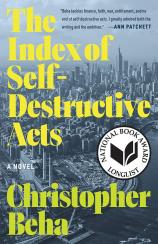The Index of Self-Destructive Acts
Review
The Index of Self-Destructive Acts
It seems certain that great works of fiction arrive at just the time we most need them. And so, while the cascading events of THE INDEX OF SELF-DESTRUCTIVE ACTS --- Christopher Beha’s moving and pleasurable third novel --- aren’t instigated by a global pandemic, its timing is auspicious. Set in New York City in 2009, amid a financial crisis whose dimensions are in the process of being eclipsed almost daily before our eyes, the book skillfully links characters trying to regain their balance in a world where their lives, like ours, have been radically disrupted.
Any novel that begins with an apocalyptic prophecy summons the feel of Chekhov’s first act gun, but Beha is up to the challenge. In this case, it’s the prophecy of a Washington Square preacher named Herman Nash that the world will end on November 1, 2009, at precisely 10pm, an event he calls the “Great Unveiling.” That’s the backdrop for a time when “it seemed Armageddon was everywhere” and against which the tangled stories of Beha’s seven principal actors play out.
At the fulcrum of the plot are Frank Doyle, a Pulitzer Prize-winning columnist of more than 30 years with the New York Herald (think an older Thomas Friedman with a touch of Roger Angell’s gift for lyrical baseball writing), and Sam Waxworth, a young software engineer and blogger freshly arrived from Madison, Wisconsin. Sam’s calling card is his successful prediction, not only of the electoral college vote in 2008, but also of every Senate, House and gubernatorial race that year (top that, Nate Silver). He’s been hired to write about his data-driven insights for a venerable magazine called the Interviewer and, more importantly, its click-obsessed blog.
"...moving and pleasurable... It’s a sumptuous novel that calls insistently to the reader to return to it in those moments when it’s put aside, fueled by the elemental desire simply to find out what’s going to happen next."
Frank’s career is in free fall, after he loses his column following a racist remark about Barack Obama during a baseball broadcast. He’s now mostly vanished from public view, working fitfully on the “big book” he dreams will secure his reputation. Frank “wanted to be a man of action and a man of contemplation both, to live the story and to tell it at once, to look up at the jumbotron and see one’s own face staring back,” while Sam is scrambling for a foothold in the world of journalism. They connect when Sam is assigned to do a “reappraisal” of the disgraced columnist.
Sam’s life becomes more complicated when he meets Frank’s daughter Margo, a graduate school dropout who’s living with her parents in their Upper East Side townhouse and rambling Bridgehampton home. That’s because his wife of seven years, Lucy, soon will be joining him in New York City. Kit, Frank’s wife, is a proud, self-assured woman, heir to a private investment bank she sold just before the crash and who now must face her own family’s financial ruin after the purchaser experiences a Lehman Brothers-style collapse. One of her protégés, Justin Price, an African-American hedge fund manager with strong personal ties to the Doyle family, has retired in his mid-30s to a life of philanthropy. Eddie Doyle, Frank and Kit’s son and Justin’s close friend, is an Iraq War veteran who’s been unable to find his way in the world after his return from combat.
The ambitions, passions and neuroses of these characters become the ingredients for a hearty stew of concealment, betrayal, manipulation and longing that Beha patiently brings to a boil. The machinations of this cleverly plotted novel are too numerous to summarize in a way that’s even remotely useful, but they’re united by a timeless theme, summoned by the source of its title: a measure created by Bill James, the godfather of baseball analytics, for the “total number of hit batsmen, wild pitches, balks, and errors by a pitcher per nine innings.” It’s an apt summary of the persistently ruinous conduct that irrevocably alters the lives of these characters, eventually bringing Sam to lament:
[W]hy do we have to keep getting things wrong? If we really learned from our mistakes, shouldn’t we make fewer all the time?... We wanted to take sides. We had more and more information, which ought to make our decisions better, but all we did with this information was find new ways to fu-- up.”
Beha also seamlessly connects his characters to headline-grabbing events of recent years. Whether it’s the scandal-tarnished celebrity seeking redemption after a precipitous fall from grace, the inside trader or the plagiarist, there’s a certain roman-à-clef quality to the story that adds unobtrusive spice. In its breadth and ambition, Beha’s novel sits comfortably aside contemporary portraits of New York City, like Tom Wolfe’s THE BONFIRE OF THE VANITIES or Garth Risk Hallberg’s CITY ON FIRE. As much as any New York Times story, readers in some distant time will do well to turn to it for a vivid snapshot of the city in the first decade of the 21st century.
But for all its immediacy, there’s also a timeless feel to THE INDEX OF SELF-DESTRUCTIVE ACTS that evokes Dickens or Dostoevsky, the latter of whom provides its epigraph. It’s a sumptuous novel that calls insistently to the reader to return to it in those moments when it’s put aside, fueled by the elemental desire simply to find out what’s going to happen next. Beyond his mastery of the storyteller’s craft, Beha seriously engages with a range of moral quandaries that make the book much more than a page-turner with literary pretensions: What does it mean to be a good person? How do we measure the enduring worth of a life? Can good emerge from a great wrong? These questions and others tug at us while we’re reading and linger in the mind long after we’re done.
Reviewed by Harvey Freedenberg on May 29, 2020
The Index of Self-Destructive Acts
- Publication Date: April 13, 2021
- Genres: Fiction
- Paperback: 528 pages
- Publisher: Tin House Books
- ISBN-10: 1951142691
- ISBN-13: 9781951142698




